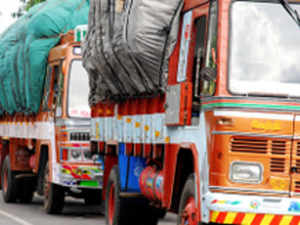News: Logistics costs set to rise as freighters hike tariffs -14-04-2020
Updated On: Apr 14, 2020
Truckers have increased tariffs by up to 80%, said people aware of the matter. Blue Dart has implemented a 25% emergency situation surcharge (ESS).
Mumbai: Truckers and transporters are increasing prices by as much as 80% and freighter operators are adding surcharges for transportation of goods as they grapple with regulatory challenges, shortage of manpower and a huge slump in supply.

This will increase logistics costs for companies and likely in products as well, industry executives said. Truckers have increased tariffs by up to 80%, said people aware of the matter. Blue Dart has implemented a 25% emergency situation surcharge (ESS). Air India said it will increase freight charges by 90% per kilo if it doesn’t have sufficient cargo to ferry.
“Truck rentals have shot up for essential items such as fruits and vegetables despite a waiver of toll fee, motor vehicle taxes and some other incentives such as deferment of EMIs on truck loans,” said SP Singh, a senior fellow at the Indian Foundation of Transport Research and Training.
Ashok Walunj, a director at the Agriculture Produce Market Committee in Maharashtra, said most truckers get to ferry cargo only one way and return with empty trucks. He said the increase in Maharashtra is only 20%.
Manpower shortage is another reason. Up to 1.5 million of 5 million truck drivers in India are not coming to work.
Last week, India’s transport ministry officials had a meeting with trucking associations to take stock of their problems. Among other things, transporters have demanded that truckers who have to drive in these conditions should be given an insurance cover of over Rs 25 lakh, said Bal Malkit Singh, a senior member of All India Motor Transport Congress, a lobbying body.
On Sunday, a directive from the home ministry said all transport of essential and non-essential goods should be allowed unhindered if the driver has a licence; empty trucks should be allowed to pass; local authorities should facilitate the movement of workers from their homes to hubs and vehicles; MSMEs dealing in essential items should be allowed to function without any obstacle and so should warehouse and cold storage facilities.
SR Sharda, executive director at logistics company Safexpress, said while this increase will taper off once the lockdown curbs are eased, it will still increase logistics costs by 25%, likely leading to an increase in prices of essentials.
“Even after the lockdown is lifted, we will be grappling with limited manpower, short supply due to lower production in factories and lower demand due to an overall negative sentiment and slowdown,” he said.
The 21-day countrywide lockdown implemented by the government on March 25 created a logjam of vehicles across the country. Most transporters were stopped by the police and were unable to ship essentials. This led to a temporary shutdown of warehouses.
A directive from the home ministry eased the problems for transporters to an extent. But logistics companies continue to face issues, especially in transporting to states such as Punjab and Uttar Pradesh, said Abhik Mittra, managing director of Spoton Logistics.
A spokesperson at Blue Dart confirmed it is levying an ESS fee of 25% for its contracted customers. On the retail desk, however, it is offering a 25% discount, he said, adding this would benefit smaller companies, including those making masks and personal protective equipment.
State-run carrier Air India, which is ferrying essentials across the country and from China, said it would increase its per kilo tariff to Rs 475 from Rs 250 for freighter flights from Hong Kong and Shanghai if there was insufficient cargo.



